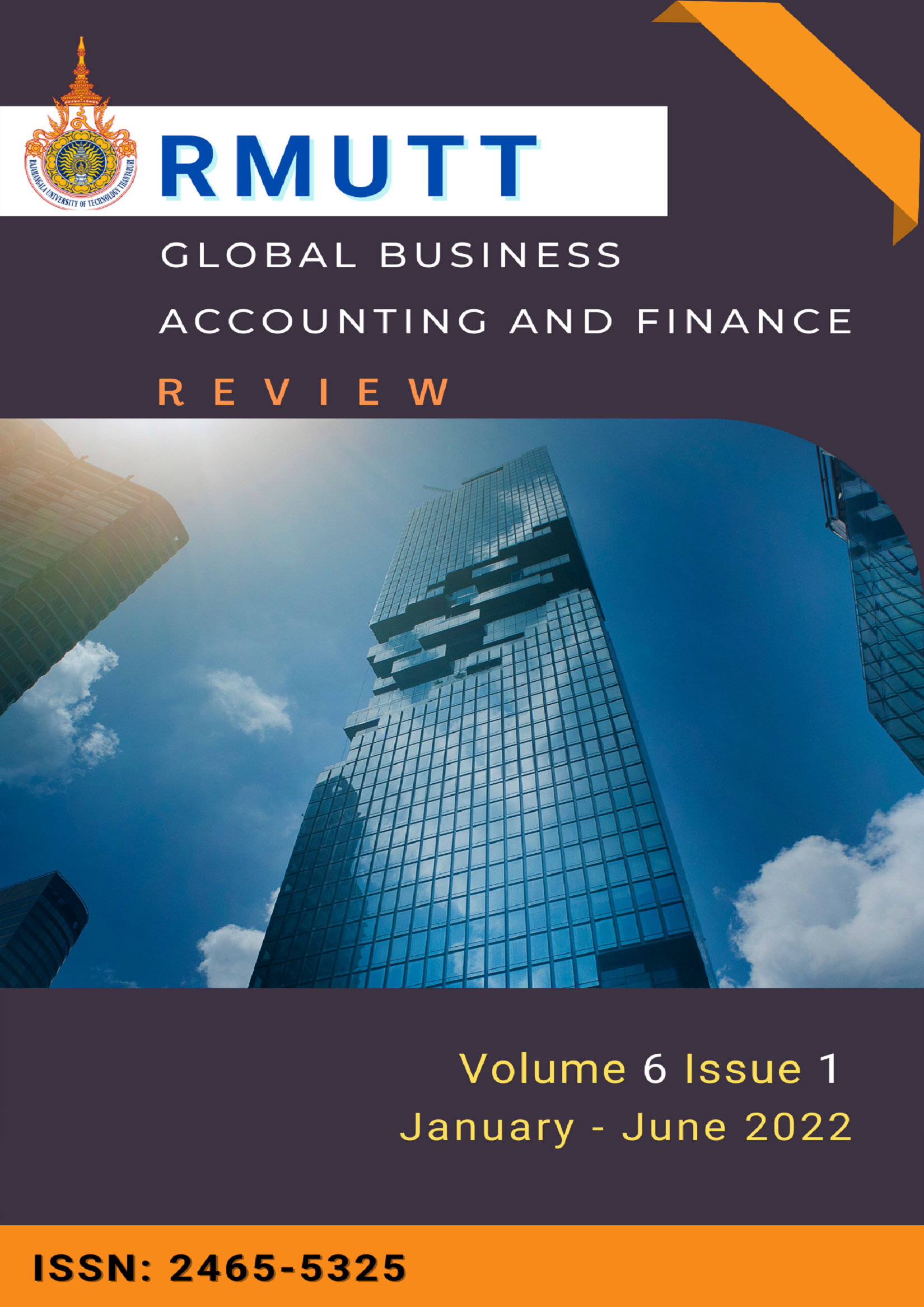OBSTACLE FACTORS THAT HINDER THE ADOPTION OF MOBILE PAYMENTS AMONG THE THAI ELDERLY
Keywords:
Payment system acceptance, innovation resistance, mobile phone deviceAbstract
The objectives of this research were to study 1) the adoption of mobile payments among the elderly when classified by personal factors; and 2) factors that hinder the adoption of mobile payments among the Thai elderly. The researcher used a convenient sample selection method. Data was collected from 570 Thai elderly people. Questionnaires were used as the research instruments and passed the content validity test and the reliability test. The statistics used in the data analysis consisted of percentage, mean, standard deviation, t-test, one-way analysis of variance, model analysis, and multiple indicators through the analysis of structural equations model (SEM). The research results showed that 1) the adoption of mobile payments among the elderly. The findings show that: 1) different genders of the elderly have statistically significant effects on mobile payment adoption at the .05 level; and 2) barriers to using mobile payments are related to the payment system via mobile.
Because the elderly has two primary impediments to embracing mobile payments: usage barriers and value barriers; therefore, research implications indicate that entrepreneurs should build trust in using mobile payment systems as well as simplify functions to manipulate more usage.
References
Aldammagh, Z., Abdeljawad, R., & Obaid, T. (2021). Predicting mobile banking adoption: an integration of TAM and TPB with trust and perceived risk. Financial Internet Quarterly'e-Finanse', 17(3), 35-46.
Aslam, W., Ham, M., & Arif, I. (2017). Consumer behavioral intentions towards mobile payment services: An empirical analysis in Pakistan. Trziste= Market, 29(2), 161-176.
Bank of Thailand. (2020). Thai society (being) cashless. Retrieved from https://www.bot.or.th/Thai/MonetaryPolicy/ArticleAndResearch/Pages/FAQ169.aspx
Bao, L., Y., & Pan, Y. (2021). A Study on the Acceptability for Mobile Payment Platforms by China's Early Elder People. Journal of the Korea Convergence Society, 12(11), 53-67.
Best, J. & Kahn, J. (1998). Research in education (8th ed.). Boston: Allyn and Bacon.
Chanton, O., Chimmasangkana, S. & Rittiboonchai, W. (2021). Influence on consumer acceptance of technology through food delivery application in Bangkok metropolitan region. RMUTT Global Business and Economics Review, 16(1), 81-92.
Chaveesuk, S., Khalid, B., & Chaiyasoonthorn, W. (2022). Continuance intention to use digital payments in mitigating the spread of COVID-19 virus. International Journal of Data and Network Science, 6(2), 527-536.
Chin, L. C., Chuen, L. X., Nee, N. S., Xue, N. W., & Jie, T. Y. (2013). Consumer resistance to mobile banking services: An empirical study among baby boomers in Malaysia urban areas. (Doctoral dissertation, University Tunku ABDUL RAHMAN).
Davis, F. D., Bagozzi, R., & Warshaw, P. (1989). User Acceptance of Computer Technology A Comparison of Two Theoretical Model. Management Science, 35, 982-1003.
Department of Provincial Administration, Ministry of Thailand. (2019). Number of elderly people divided by age range. Retrieved from https://stat.bora.dopa.go.th/new_stat/webPage/statByAgeMonth.php
Elbadrawy, R., & Azizz, R. (2011). Resistance to Mobile Banking Adoption in Egypt: A Cultural Perspective. International Journal of Managing Information Technology, 3(4), 9-21.
Getinvoice. (2019). What is E-Payment?. Retrieved from https://www.getinvoice.net/e-payment-2/
Hair, J. F., Black, W. C., Babin, B. J., & Anderson, R. E. (2010). Multivariate Data Analysis: Global Edition (7th Ed.). NY: Pearson Prentice Hall.
Han, J. H., Jae, S. H., Kim, B. H., & Park, J. S. (2015). Effects of consumer trust and perceived usefulness on mobile payments and online shopping website loyalty. Journal of Digital Convergence, 13(12), 75-87.
Jöreskog, K. G., & Sörbom, D., (2012). LISREL 9.1: LISREL syntax guide. Chicago: Scientific Software International, Inc,.
Kitisitthichai, C. (2018). Factors of Technology Acceptance Affecting Attitude and Intention to Use E-Wallet among Consumers in Bangkok. (Master's Thesis, Bangkok University, Thailand).
Kumari, P. R., & Lodha, A. (2021). Moderating effect of self-efficacy and social influence on e-payments adoption among Indian millennials. International Journal of Technology Marketing, 15(2-3), 203-222.
Lobphai, S. (2016). Perceived security, usefulness, and ease of use affecting the mobile payment service usage of consumers in Bangkok. (Master’s Thesis, Bangkok University, Thailand).
Manoi, S., & Cholpaisal, A. (2019). Factors affecting acceptance of Mobile Payments Using QR Code: The Case of Bangkok. DPU Graduate Studies Journal, 8(1), 350-361.
Rahayu, R. (2022). Factors That Influence the Behavioral Intention to Use E-Payments in Indonesia. Ekonomis: Journal of Economics and Business, 6(1), 116-125.
Ram, S. & Sheth, J. N. (1989). Consumer resistance to innovations: the marketing problem and its solutions. Journal of Consumer Marketing, 6(2), 5-14.
RJOAS, (2018, June). Technology Acceptance Model (TAM). Theoretical Framework, 6(78).
Setiawan, M., & Setyawati, C. Y. (2020). The influence of perceived ease of use on the intention to use mobile payment. Journal of Accounting and Strategic Finance, 3(1), 18-32.
Srilert. N. (2020). Supattanapong tells the story behind the success. "Half-per-person project". Retrieved from https://www.bangkokbiznews.com/news/detail/910648
Teo, A. C., Cheah, C. M., Ooi, K. B., & Wong, J. C. (2013). Why Consumers Resist Mobile Payment? A Conceptual Model. In Diversity, Technology, and Innovation for Operational Competitiveness: Proceedings of the 2013 International Conference on Technology Innovation and Industrial Management (pp. S4_222-226). ToKnowPress.
Udornchainit, L. (2019). The Influence of Perceive Benefits and Satisfaction on the Reliability of the Mobile Banking System in Bangkok. (Master’s Thesis, Rajamangala University of Technology Krungthep, Thailand).
Wilasri, J. & Thongmak, M. (2015). A study of the influence of factors that hinder the acceptance of Payment via mobile device. Journal of Graduate School of Commerce Burapha Review, 10(2), 37-51.
Downloads
Published
How to Cite
Issue
Section
License
Copyright (c) 2022 Faculty of Business Administration, Rajamangala University of Technology Thanyaburi

This work is licensed under a Creative Commons Attribution-NonCommercial-NoDerivatives 4.0 International License.









